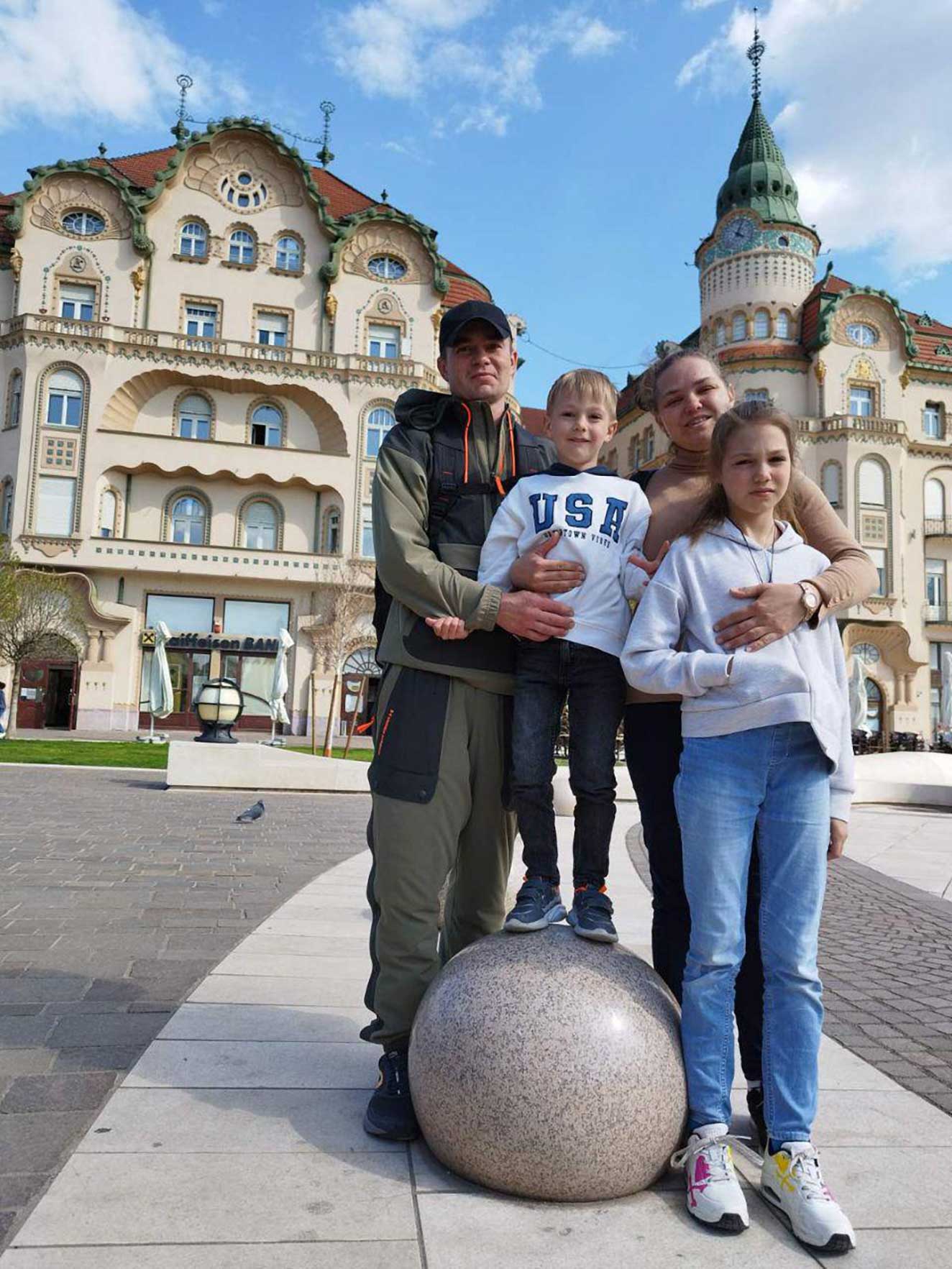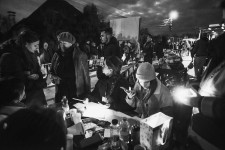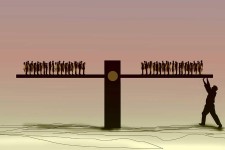From Kam'yanka, Sergiy's village, there is only one settlement left on the map, south of Izium, in the Kharkiv region. The settlement was completely wiped out by the Russians in the spring of 2022. After seeing the house he spent four years working on destroyed by bombs and after being forced into Russian-occupied territory and made to dig bodies out from under the rubble, Sergiy travelled 6,000 kilometres to reunite with his children and wife, who took refuge in Cluj.
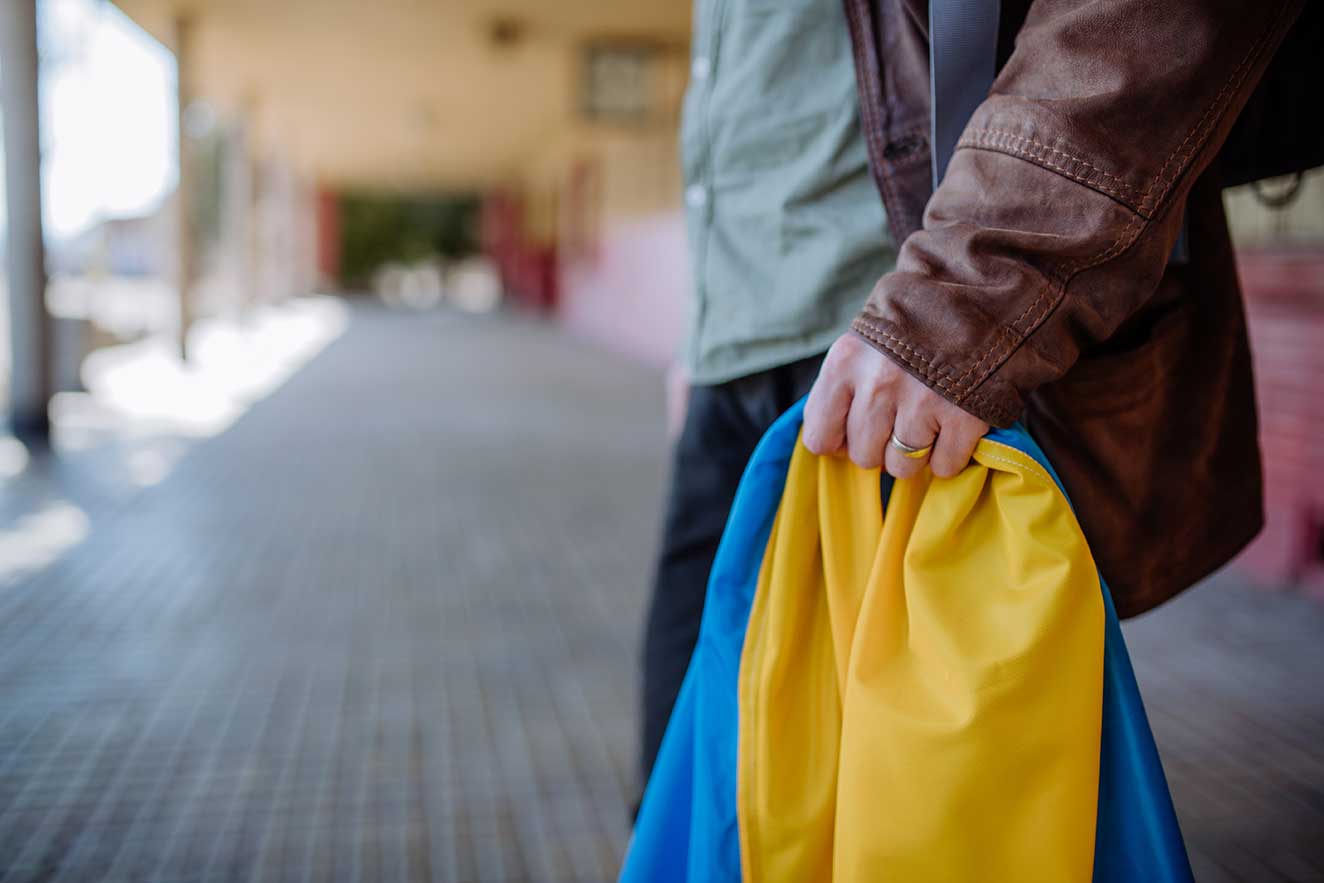
The mixture
On March 5th, 2022, standing in front of the gate of their house, Sergiy said goodbye to his wife and two children. Since the start of the war, they spent most of their time in the cellar, listening to the sound of bombs outside. "In Kam'yanka everyone had two and a half metres deep cellars," says Sergiy, with a certain pride in his tone. You'd think this is perhaps the only thing that distinguishes his otherwise ordinary village from the rest of the villages in eastern Ukraine. No one expected the war to reach Kam'yanka. Why would the Russians be there? But that's just what happened in early March, when some of the rockets that were constantly flying above their heads ended up falling in the village. Then more and more and more, more often.
Sergiy decided to send his family to a safe place in the west of the country, joined by his wife's sister, who had just given birth. They heard from friends that trains with women and children were leaving from Kramatorsk. He would have wished to join them to the railway station, the journey would have been only an hour long, but he couldn't, there were not enough seats: "I can't really describe how I felt when I saw them leaving. A mixture of loneliness, fear, despair, frustration... The feeling that my life was pointless, that I was useless, that I had no power to change anything that was happening to them."
After they left, Sergiy went into the cellar, took all the meat out of the freezer and shared it with his neighbours. The village was out of electricity. "We had plenty. Pork and fish. I saved some for myself, just enough to be cooked before it got spoiled."
He grabbed his phone and went inside to look at their pictures. He glanced once more at the last photo of his family. It was taken just the day before, in the basement shelter: his wife smiling, holding their little son. Their little girl, wearing a pink winter jacket, hugging her grandmother, glancing at her mother. Behind them, in the background, the bolted wall, the shelves filled with marmalade, a reading lamp, pinned to one of the shelves, above the improvised bed.
Then Sergiy turned off the phone. He was going to power it up again over the next few weeks, every now and then, just for that: to look at their pictures.
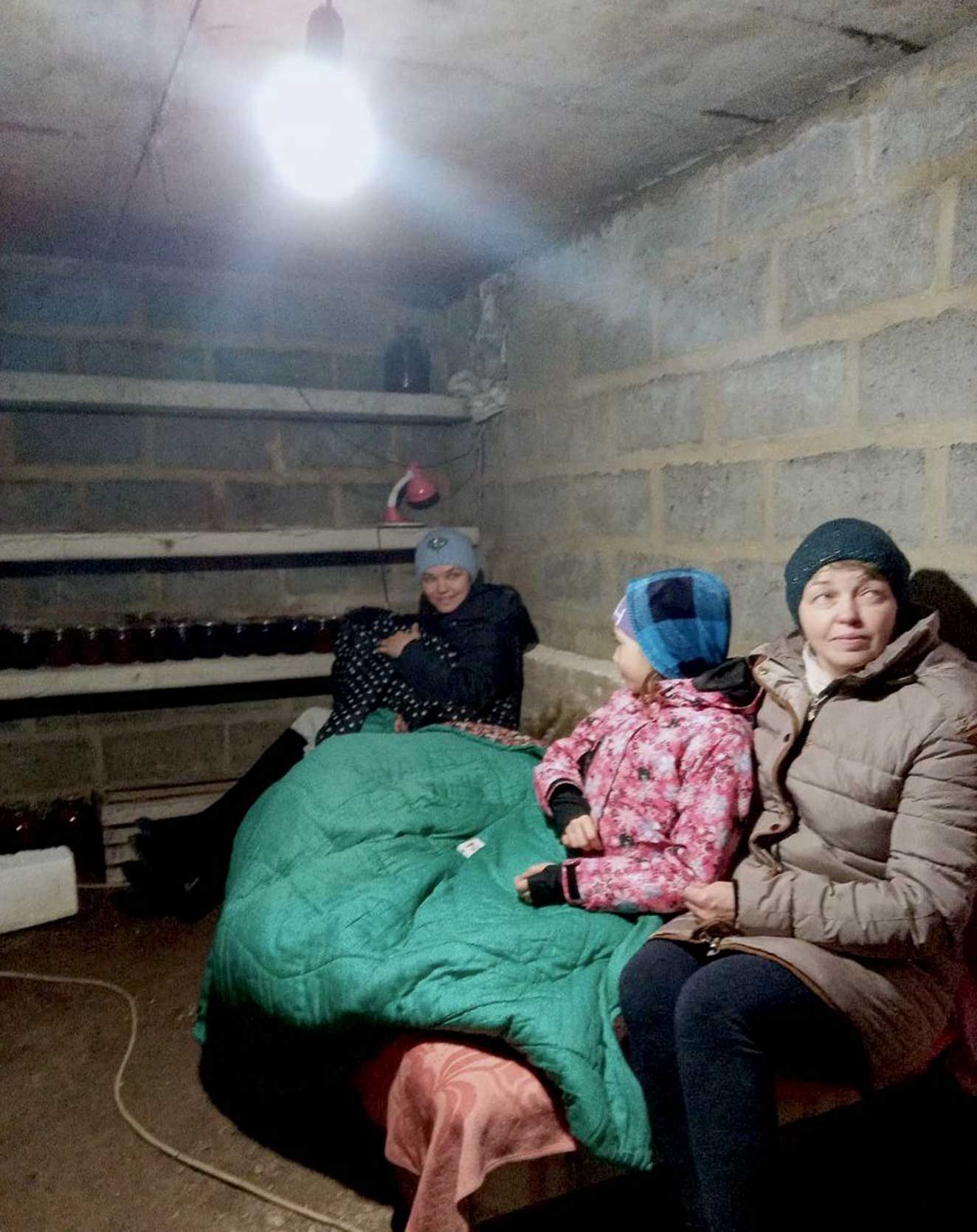
To ease the burden, he locked up the house and moved in with his in-laws. In their basement.
One of the next days, seeking to shake off the feeling of helplessness that never left him, he went to a recruitment centre and made himself available to the people there. "Some other men from the village were also there. They said they didn't have any weapons or equipment so they had no use for our help. They requested my phone number, to call me in case anything changed."
They never called him again.
Before the war started, Sergiy worked on a fish farm not far from Izium. His wife was a teacher in the village. In recent years they have invested considerable time and money to renovate the house. They built a second floor and a garage. When the war started, they had not yet finished.
On 10th of March, their house was bombed and destroyed. " I worked on that house for four long years. I saw the ruin with my own eyes. Ukrainian soldiers took shelter in our cellar. They parked their tank and an armoured car in our garden. They all died in the explosion."
The premonition
Just a few days after Sergiy's family left, some heavy raids began. They were lucky. Sergiy and his in-laws spent countless days in the basement, keeping track of the growing sound of the hell outside. "We counted five explosions in a single minute. On the clock. They were firing at all the buildings around, from tanks, from planes."
Sergiy would occasionally go out, just to see what was happening: "Above us the sky was red, the buildings surrounding us on fire."
To stop the Russian advance, the Ukrainians destroyed all the bridges to Izium, a town flanked by two rivers. "Our people had a good position on the hill. But when they destroyed the bridges, they trapped the Russians in our village. They were shooting at each other, and we were caught in the middle." Because the fighting got more brutal each day, Sergiy and his in-laws, together with some neighbours, prepared to leave the village. They had three cars. But his father-in-law changed his mind at the last minute. "He told me he felt something bad was going to happen if they left, so we decided to stay. I saw the other two cars being hit by a rocket. They all died, except one woman, who was taken to hospital, badly injured."
At one point the Russians managed to cross the river on a floating bridge. The Ukrainian army gunned them down and many Russians drowned. "In the river, on the banks, there were so many dead bodies. Russians. Nobody removed them from there, they were just lying there."
The Russian bullet
The Russians occupied Izium and Kam'yanka in late March. They marched into the village and started shooting people in the cellars. "They were poorly dressed and hungry. They were looking for clothes, asking for food. Some of them seemed decent, but others... They were taken away. They looked like boozers, but you couldn't feel alcohol on their breath. They were high."
Convinced that Sergiy was an Ukrainian soldier, a Russian forced him on his knees and put a gun to his head. No use trying to convince him otherwise. "I'm not a soldier!" tried Sergiy, one last time. Everything else, that he was a local, born in Izium, moved to Kam'yanka when he was eight, that he had two children, that his wife was a teacher at the school across the street, that he worked on the fish farm, he never mentioned again. There was no point, he had no one to talk to.
If he could only have gone down to the cellar to get his ID... But the soldiers wouldn't allow him to, nor were they willing to descend themselves. Because if Sergiy really was a Ukrainian soldier, there would have been others in the cellar, with their guns aimed out, ready to kill the Russian soldiers. He gave up. "That's it, my time has come...", he thought.
"He's not a soldier!" a woman cried out. "He's my neighbour, let him go! Leave him alone!" Somehow, someway, her voice convinced the Russians, and the barrel of the rifle descended to the ground.
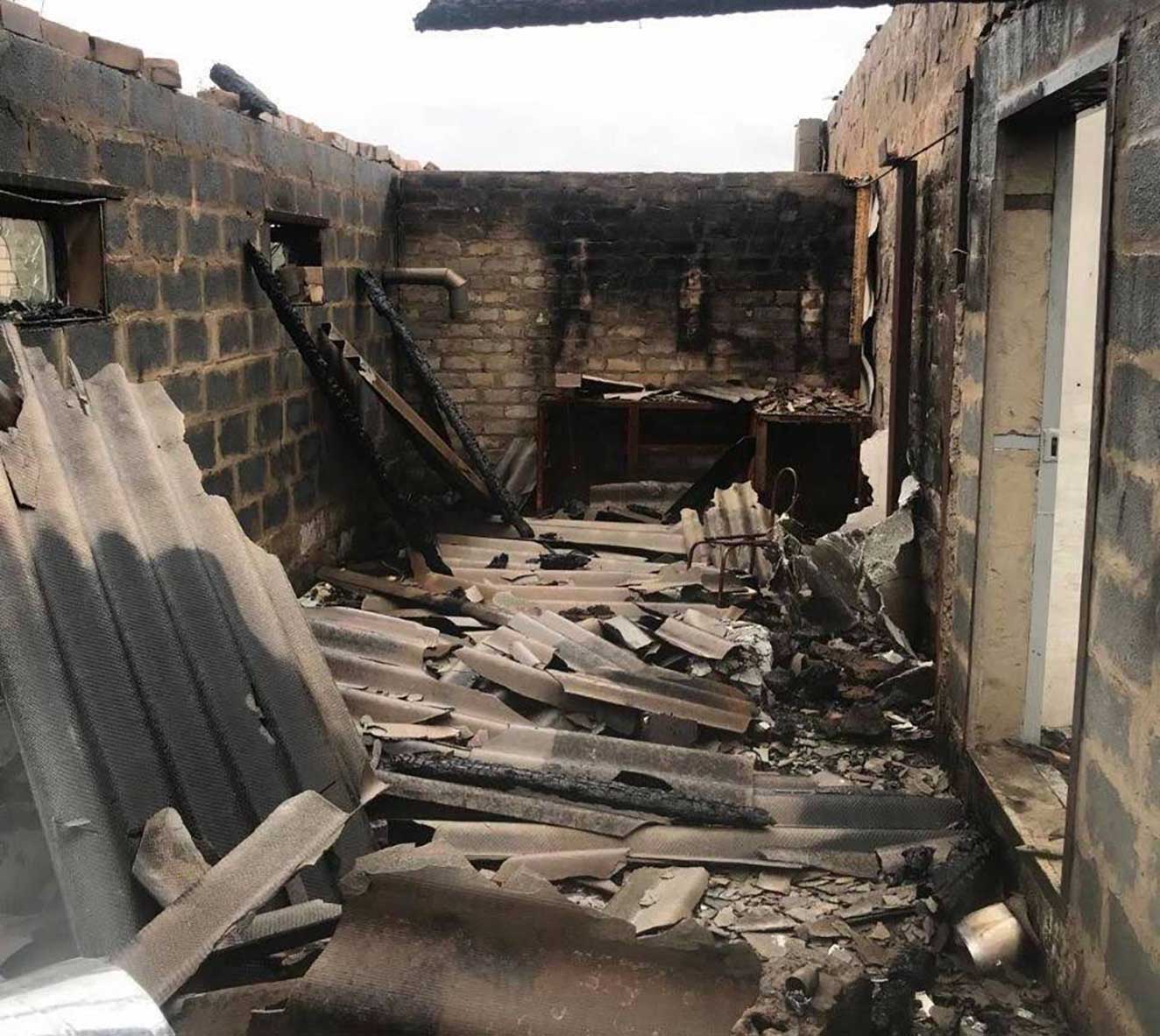
"I'm alive. I love you!"
On March 31st, the Russians herded the remaining villagers in Kam'yanka into two trucks. "That's how we left Kam'yanka. There were 63 of us. They forced us to hop on, otherwise they would shoot us. That was the last time I saw my village."
They crossed the Donets River on pontoon bridges to the Russian-occupied Izium. Sergiy expected to get better gsm reception up on the hill. He was right. His message was written in advance, ever since the power went out and the village was out of coverage. He'd saved it in his phone, ready to send it with a tap of his finger the first chance he got: 'I'm alive. I love you!".
When they reached the top of the hill, he turned on his phone, and when he saw the first dashes, he sent the message. Moments later, his family was trying to call him. But what if the soldiers suspected him of spying? What if they thought he was giving away their location? He rejected the calls.
He hadn't spoken to his family for almost three weeks. He was about to learn that a neighbour saw his house destroyed, saw the burnt bodies of Ukrainian soldiers, and told his wife that Sergiy had died in the explosion. His family had tried in vain to somehow recover the body to identify him.
When the trucks arrived in Izium the soldiers took them out and said, "All right, now you're free. Leave!". "We didn't know what to do. Go where?", recounts Sergiy.
Stairway to Hell
There was a curfew in the city, civilians were only allowed out between certain hours, from 8am to 6pm. Izium was packed with checkpoints, and everyone was asked for documents. "They looked for tattoos. If you had tattoos with national symbols, specific to soldiers... you disappeared. You were taken to certain places, tortured, starved, beaten."
One of the days they also took Sergiy to such a place, for a few hours. "They picked me up because of my military ID. They asked me who I was fighting for, if I knew people in the civilian paramilitary groups who were harassing the Russians. I told them I didn't know anything. They didn't believe me... They put the gun to my head, the knife to my throat. Those men knew how to get answers!". Eventually they released him.
He learned that there were plenty of civilians who procured weapons and organised to fight the invaders. He learned that the Russians walked in on two boys and, without asking, shot them on site. "They'd been ratted out by a babushka." Sergiy knows this story because he and another man were put in charge of digging the graves for those two boys.
While in Izium, he dug six graves, but that was not the most horrible thing he did. "Since the beginning of the war the Russians destroyed many residential buildings. Several of my children's schoolmates and their families were killed in such an attack. On many sites the bodies remained under the rubble for weeks. Sergiy had been forced, along with other Ukrainians, to pull them out of and transport them out of town. "We used to carry them in blankets across the floating bridge. The smell... The images that stuck in my mind... It's the most horrible thing I've ever experienced."
Sergiy spent a month in Izium. During this time he carried 40 corpses out of the ruins. "They said that we were under Russian protection, that there was peace there, but very often entire cluster bombs fell in Izium, spreading over a radius of three kilometres when they exploded. They used such bombs 30 times a day while I was there. I said to myself that if I'm going to die, I might as well do something and try to escape."
He was constantly thinking of making a run for it, but where else to go? How? There was no way he could cross into Ukraine, the Russians had set up too many checkpoints. Even more, Sergiy says, "Fake Ukrainian checkpoints were set up on the way out of the city, with Russian soldiers in Ukrainian uniforms, flags, symbols, everything. But their sole purpose was to discourage us from crossing. The Russian ones would let us through, but when we got to the Ukrainian ones, the fake ones, the soldiers would chase us away, shoot at us."
He left on May 14. To Russia.
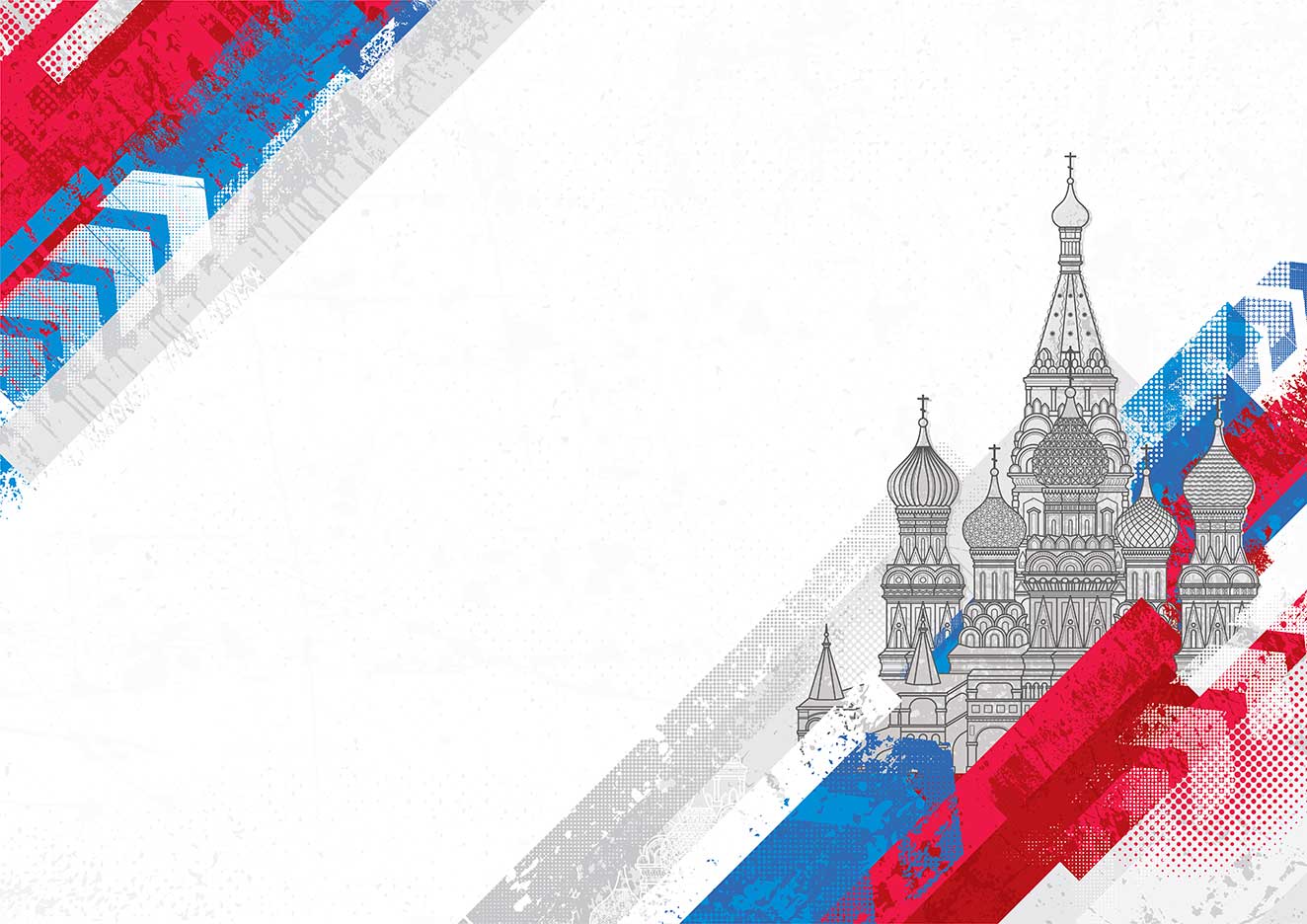
Westwards, through the east
Sergiy was among the first Ukrainians to venture to Europe via Russia after the war started. A 6,000 km long route.
"In order to be allowed to get to Russia, I had to declare that I was pro-Russian, not tell them that I wanted to cross the border and then go to the West. But that wasn't enough, I had to give them the contact details of the people I was going to stay with, and the customs officers were calling those people, checking them out." So Sergiy gave them the names of people he knew and was allowed to enter Russia.
At the border, near Belgorod, there were some people from Dagestan who made runs from customs to the railway station. The one Sergiy chose, in order to earn more money, took them to the furthest possible station. But all for the best: here Sergiy met a woman with two children from the Donetsk area who taught him how to get out of Russia to Latvia. Together they took a train from Voronezh to Moscow, and once in the capital, boarded a minibus that travelled 200 kilometres to the Latvian border. "I could tell that something was bothering the Russian customs officers, but they didn't stop me. I crossed the border on foot without any problems. I was afraid they wouldn't let me, because I have a Ukrainian passport, but it was OK. And when I crossed the border, I felt like I was in another world. There were people smiling, people going on with their lives..."
A few weeks later, Sergiy arrived in Cluj where he rejoined his family. Almost three months had passed. "It was easy for us to settle here. My wife teaches Ukrainian children in Cluj. I found a job at a car wash."
They don't know if they will ever return home. It's no longer clear to them what home really means. Their village no longer exists, it was obliterated, same as many other villages in eastern Ukraine.
Kam'yanka was under Russian occupation from April to September 2022. Out of 450 houses before the war, only five are still standing, says Sergiy. He spoke to people who went back to repair their homes, but many lost their legs to landmines.
"The place is packed with landmines. I know at least 15 men who now have no legs. People use pickaxes to get rid of landmines, they clear their own yards, they don't wait for the authorities to do it. Some Finnish experts said that the area will not be safe for another 15 to 17 years." But if they'll stay longer in Romania, Sergiy hopes to open a fish farm. Like the one he worked in for 13 years, back home.
